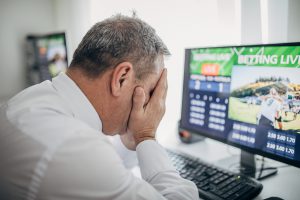 When you’re virtually betting on a football game or playing casino games like poker or roulette through a website or an app, there are plenty of opportunities and platforms available today for online gambling. However, with such an increase in options for gambling virtually, there is also an increased risk of developing a gambling addiction, so it’s important to be able to identify the signs of this kind of addiction in yourself as they appear.
When you’re virtually betting on a football game or playing casino games like poker or roulette through a website or an app, there are plenty of opportunities and platforms available today for online gambling. However, with such an increase in options for gambling virtually, there is also an increased risk of developing a gambling addiction, so it’s important to be able to identify the signs of this kind of addiction in yourself as they appear.
A gambling addiction, also known as gambling disorder, involves a compulsion to repeatedly gamble with increasing amounts of money in order to achieve a desired level of excitement, even when this behavior is causing financial harm to yourself and your family. Gambling can be as addictive (and, potentially, as destructive) as alcohol or drugs; in fact, the American Psychiatric Association places gambling disorder in the same classification level as these substance use disorders.
Gambling disorder develops gradually, so you may not immediately recognize signs of this problem when they begin to appear. According to the American Psychiatric Association, a doctor may diagnose a person with gambling disorder if they recognize four or more of the following symptoms:
- Compulsion to gamble with increasing amounts money for excitement
- Restlessness or irritability while trying to reduce gambling
- Repeated unsuccessful attempts to limit time spent gambling
- Frequent thoughts about gambling
- Gambling as a result of distress
- Often attempting to win back gambling losses
- Hiding gambling activity
- Risking relationships, employment, or educational opportunities to continue gambling
- Relying on other people for help with financial problems while gambling
For people who gamble virtually, the risks of developing an addiction are significantly higher than someone who only does it in a physical location, as opportunities to continue gambling are always available and accessible. Some steps you can take to prevent or treat gambling disorder in this situation include:
- Reaching out for mental and emotional support from trusted people or support groups
- Distracting yourself with different activities
- Thinking about what will happen when you gamble, particularly in terms of damage to relationships and opportunities
- If necessary, deleting gambling-related apps from your device
- Getting help from a licensed psychiatrist
If you need professional help coping with gambling disorder, you can schedule an appointment with a psychiatrist at Jamaica Hospital Medical Center’s Outpatient Psychiatric Clinic by calling (718) 206-5575.
All content of this newsletter is intended for general information purposes only and is not intended or implied to be a substitute for professional medical advice, diagnosis or treatment. Please consult a medical professional before adopting any of the suggestions on this page. You must never disregard professional medical advice or delay seeking medical treatment based upon any content of this newsletter. PROMPTLY CONSULT YOUR PHYSICIAN OR CALL 911 IF YOU BELIEVE YOU HAVE A MEDICAL EMERGENCY.
